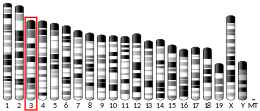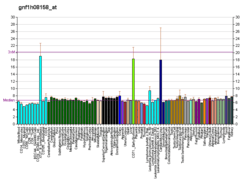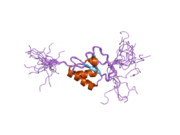ECT2
Protein ECT2 is a protein that in humans is encoded by the ECT2 gene.[4][5][6]
Function
The protein encoded by this gene is a transforming protein that is related to Rho-specific exchange factors and yeast cell cycle regulators. The expression of this gene is elevated with the onset of DNA synthesis and remains elevated during G2 and M phases. In situ hybridization analysis showed that expression is at a high level in cells undergoing mitosis in regenerating liver. Thus, this protein is expressed in a cell cycle-dependent manner during liver regeneration, and is thought to have an important role in the regulation of cytokinesis.[6]
References
- GRCm38: Ensembl release 89: ENSMUSG00000027699 - Ensembl, May 2017
- "Human PubMed Reference:". National Center for Biotechnology Information, U.S. National Library of Medicine.
- "Mouse PubMed Reference:". National Center for Biotechnology Information, U.S. National Library of Medicine.
- Miki T, Smith CL, Long JE, Eva A, Fleming TP (Apr 1993). "Oncogene ect2 is related to regulators of small GTP-binding proteins" (PDF). Nature. 362 (6419): 462–5. doi:10.1038/362462a0. PMID 8464478.
- Tatsumoto T, Xie X, Blumenthal R, Okamoto I, Miki T (Dec 1999). "Human ECT2 is an exchange factor for Rho GTPases, phosphorylated in G2/M phases, and involved in cytokinesis". J. Cell Biol. 147 (5): 921–8. doi:10.1083/jcb.147.5.921. PMC 2169345. PMID 10579713.
- "Entrez Gene: ECT2 epithelial cell transforming sequence 2 oncogene".
- Liu XF, Ishida H, Raziuddin R, Miki T (Aug 2004). "Nucleotide exchange factor ECT2 interacts with the polarity protein complex Par6/Par3/protein kinase Czeta (PKCzeta) and regulates PKCzeta activity". Mol. Cell. Biol. 24 (15): 6665–75. doi:10.1128/MCB.24.15.6665-6675.2004. PMC 444862. PMID 15254234.
Further reading
- Takai S, Long JE, Yamada K, Miki T (1995). "Chromosomal localization of the human ECT2 proto-oncogene to 3q26.1-->q26.2 by somatic cell analysis and fluorescence in situ hybridization". Genomics. 27 (1): 220–2. doi:10.1006/geno.1995.1033. PMID 7665179.
- Hillier LD, Lennon G, Becker M, Bonaldo MF, Chiapelli B, Chissoe S, Dietrich N, DuBuque T, Favello A, Gish W, Hawkins M, Hultman M, Kucaba T, Lacy M, Le M, Le N, Mardis E, Moore B, Morris M, Parsons J, Prange C, Rifkin L, Rohlfing T, Schellenberg K, Bento Soares M, Tan F, Thierry-Meg J, Trevaskis E, Underwood K, Wohldman P, Waterston R, Wilson R, Marra M (1996). "Generation and analysis of 280,000 human expressed sequence tags". Genome Res. 6 (9): 807–28. doi:10.1101/gr.6.9.807. PMID 8889549.
- Kimura K, Tsuji T, Takada Y, Miki T, Narumiya S (2000). "Accumulation of GTP-bound RhoA during cytokinesis and a critical role of ECT2 in this accumulation". J. Biol. Chem. 275 (23): 17233–6. doi:10.1074/jbc.C000212200. PMID 10837491.
- Wennerberg K, Ellerbroek SM, Liu RY, Karnoub AE, Burridge K, Der CJ (2002). "RhoG signals in parallel with Rac1 and Cdc42". J. Biol. Chem. 277 (49): 47810–7. doi:10.1074/jbc.M203816200. PMID 12376551.
- Matsuda A, Suzuki Y, Honda G, Muramatsu S, Matsuzaki O, Nagano Y, Doi T, Shimotohno K, Harada T, Nishida E, Hayashi H, Sugano S (2003). "Large-scale identification and characterization of human genes that activate NF-kappaB and MAPK signaling pathways". Oncogene. 22 (21): 3307–18. doi:10.1038/sj.onc.1206406. PMID 12761501.
- Saito S, Tatsumoto T, Lorenzi MV, Chedid M, Kapoor V, Sakata H, Rubin J, Miki T (2003). "Rho exchange factor ECT2 is induced by growth factors and regulates cytokinesis through the N-terminal cell cycle regulator-related domains". J. Cell. Biochem. 90 (4): 819–36. doi:10.1002/jcb.10688. PMID 14587037.
- Hara T, Ishida H, Raziuddin R, Dorkhom S, Kamijo K, Miki T (2004). "Novel kelch-like protein, KLEIP, is involved in actin assembly at cell-cell contact sites of Madin-Darby canine kidney cells". Mol. Biol. Cell. 15 (3): 1172–84. doi:10.1091/mbc.E03-07-0531. PMC 363103. PMID 14668487.
- Liu XF, Ishida H, Raziuddin R, Miki T (2004). "Nucleotide exchange factor ECT2 interacts with the polarity protein complex Par6/Par3/protein kinase Czeta (PKCzeta) and regulates PKCzeta activity". Mol. Cell. Biol. 24 (15): 6665–75. doi:10.1128/MCB.24.15.6665-6675.2004. PMC 444862. PMID 15254234.
- Kim JE, Billadeau DD, Chen J (2005). "The tandem BRCT domains of Ect2 are required for both negative and positive regulation of Ect2 in cytokinesis". J. Biol. Chem. 280 (7): 5733–9. doi:10.1074/jbc.M409298200. PMID 15545273.
- Oceguera-Yanez F, Kimura K, Yasuda S, Higashida C, Kitamura T, Hiraoka Y, Haraguchi T, Narumiya S (2005). "Ect2 and MgcRacGAP regulate the activation and function of Cdc42 in mitosis". J. Cell Biol. 168 (2): 221–32. doi:10.1083/jcb.200408085. PMC 2171585. PMID 15642749.
- Yüce O, Piekny A, Glotzer M (2005). "An ECT2-centralspindlin complex regulates the localization and function of RhoA". J. Cell Biol. 170 (4): 571–82. doi:10.1083/jcb.200501097. PMC 2171506. PMID 16103226.
- Niiya F, Xie X, Lee KS, Inoue H, Miki T (2005). "Inhibition of cyclin-dependent kinase 1 induces cytokinesis without chromosome segregation in an ECT2 and MgcRacGAP-dependent manner". J. Biol. Chem. 280 (43): 36502–9. doi:10.1074/jbc.M508007200. PMID 16118207.
- Zhao WM, Fang G (2005). "MgcRacGAP controls the assembly of the contractile ring and the initiation of cytokinesis". Proc. Natl. Acad. Sci. U.S.A. 102 (37): 13158–63. doi:10.1073/pnas.0504145102. PMC 1201590. PMID 16129829.
- Hara T, Abe M, Inoue H, Yu LR, Veenstra TD, Kang YH, Lee KS, Miki T (2006). "Cytokinesis regulator ECT2 changes its conformation through phosphorylation at Thr-341 in G2/M phase". Oncogene. 25 (4): 566–78. doi:10.1038/sj.onc.1209078. PMID 16170345.
- Niiya F, Tatsumoto T, Lee KS, Miki T (2006). "Phosphorylation of the cytokinesis regulator ECT2 at G2/M phase stimulates association of the mitotic kinase Plk1 and accumulation of GTP-bound RhoA". Oncogene. 25 (6): 827–37. doi:10.1038/sj.onc.1209124. PMID 16247472.
- Nishimura Y, Yonemura S (2006). "Centralspindlin regulates ECT2 and RhoA accumulation at the equatorial cortex during cytokinesis". J. Cell Sci. 119 (Pt 1): 104–14. doi:10.1242/jcs.02737. PMID 16352658.
This article is issued from Wikipedia. The text is licensed under Creative Commons - Attribution - Sharealike. Additional terms may apply for the media files.






